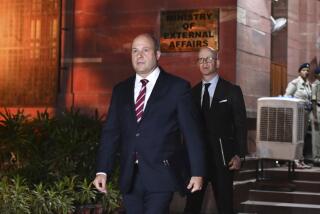France-Canada Flap: Diplomatic Crisis
- Share via
TORONTO — What began as a dispute over territorial fishing rights has degenerated into a full-blown diplomatic crisis between France and Canada, complete with arrests, formal protests and disruption of high-level official contacts.
The latest phase of the flap came Monday when Canadian External Affairs Minister Joe Clark filed a protest with the French government in Paris complaining that “senior authorities in France” had authorized the harassment of Canadian tourists leaving French airports.
That followed Paris’ recall Sunday of the French ambassador to Canada on grounds that the arrest Thursday of 17 French fishermen and four French politicians and the confiscation of a fishing trawler was “unacceptable incarceration” and an “arbitrary decision” that inflamed “the emotions of French authorities.”
Violated Ban
The immediate crisis developed Thursday when the trawler Croix de Lorraine with the crew and the politicians, including two French senators and two local officials from the French islands of St. Pierre and Michelon, sailed into Canadian territorial waters off the coast of Newfoundland and violated a Canadian ban against fishing.
The boat was seized and taken to St. John’s, Newfoundland, where the 17 men were held in jail until Sunday night, when they were released on $24,300 bail each pending a trial next October. The men were flown to St. Pierre on Monday, but the boat is still held by Canada.
The root of the dispute goes back 18 months when negotiations over territorial sea boundaries broke down after Canada accused France of “flagrant overfishing” in the Gulf of St. Lawrence. At that point, Canada banned French trawlers from the area and closed its ports to French fishing vessels.
France claims territorial fishing and other economic rights in a 200-mile zone extending from St. Pierre and Michelon, which are off the south coast of Newfoundland. The islands’ 6,000 residents are French citizens.
The Canadians recognize only a 12-mile limit around the islands and argue that the French 200-mile claim overlaps Canada’s sovereign waters.
Addressing Parliament on Monday, Clark tried to calm the dispute without softening Canada’s position. He said French authorities responded to his protest by saying that harassment of Canadian tourists will stop, and he added that negotiations on the fishing limits will resume Thursday.
The dispute is the most serious confrontation between the two nations since 1969, when then-President Charles de Gaulle of France caused an uproar when he seemed to endorse the Quebec independence movement. That rift was finally closed last year, when President Francois Mitterrand visited Canada and made amends.
The current controversy threatens to spill over into two major financial deals between France and Canada. The Ottawa government is considering purchasing seven nuclear submarines, and France was considered to have the inside track.
Also, Air Canada, the national airline, has been negotiating to buy more than 30 airliners from a consortium partly owned by the French government. And while Clark told Parliament that Canada will continue to seek the best deal, sources in the government said that senior officials will re-examine their interest if the territorial dispute does not ease.
French officials, for their part, said they would not modify their stand unless Canada dismissed the charges against the arrested men and moved more rapidly toward a settlement of the root problem.
More to Read
Sign up for Essential California
The most important California stories and recommendations in your inbox every morning.
You may occasionally receive promotional content from the Los Angeles Times.










